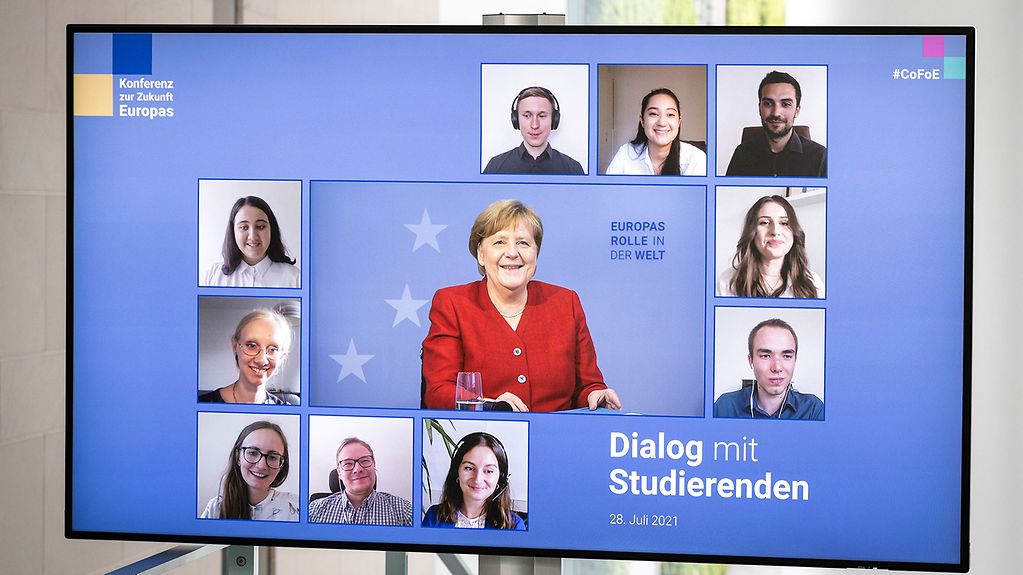Conference on the Future of Europe
Federal Chancellor Merkel took part in an online dialogue to exchange views with ten European students. Discussion focused on conceptions of Europe and Europe’s role in the world. The event took place as part of the Future of Europe Conference, where people from throughout the EU discuss ideas relating to Europe of the future.
4 min reading time

Federal Chancellor Merkel spoke to students about Europe’s role in the world.
Photo: Federal Government/Bergmann
According to Federal Chancellor Angela Merkel, the best way to talk about the future of Europe is to engage with young people who already have some experience of Europe. “What do you want from Europe and what does Europe mean to you?” – these were topics of particular interest to the Federal Chancellor in her conversation with ten students from various EU countries on Monday.
From Vilnius to London, from Seville to Rome and from Prague and Glasgow – there is a wide range of Erasmus programmes that enable young people to gain experience of Europe. For Hannah Nitsch, what is special about Europe is its “freedom” and “diversity”, as well as the chance to “get to know lots of students from other European countries”. She talked about her last year in London just before Brexit and the sadness felt by many students: soon it would no longer be so easy to take an Erasmus programme in the UK, she said.
The Federal Chancellor promised to advocate the continuation of exchange programmes when she spoke to British Prime Minister Boris Johnson on her visit to London on Friday.
Freedom to travel, diversity and a greater sense of natural integration
Stella Kim from Germany and Jan Tylk from the Czech Republic appreciate the ease of travel in the EU – as well as the fact that it’s so easy for them to make cheap phone calls home without having to pay roaming charges: “It’s important to get to know people from the other countries,” said the Czech student.
German-Spanish student Adrian Alonso Alvarez would like to see less nationalism; European integration should be something people regard as more natural, he said: “I’m European.” Ophélie Ranquet from France is currently studying in Karlsruhe. She is fascinated by the way “we often all have different perspectives, yet ultimately we all share the same values”. One thing the students particularly have in common is the valuable experience they gained on their EU-funded Erasmus programmes: they learnt languages, met new people from other nations and got a sense of the diversity of European culture.
Video
Europe’s role in the world
Another topic of discussion was Europe’s role in the world. The Lithuanian Roberta Bartkute, who is studying history in Berlin, referred to the recent Franco-German proposal at the European Council: a meeting of EU heads of state and government with Russian President Vladimir Putin. Many Eastern and Central European countries did not support this idea, she said, which she believed was a sign of starkly differing perceptions of Russia within Europe.
On this point, Federal Chancellor Merkel noted that she did not see these talks as a sign of good relations with Russia, but rather as an opportunity for Europeans to voice their criticism of Russia: “We have many good arguments on our side.”
Speaking with a single voice
As the Federal Chancellor stressed: “We in Europe can only be strong if we speak with a single voice.” This applied not only to Russia, she said, but also to other countries with a very different social order, such as China.
This sentiment was echoed in comments made by Jonathan Weikl, who is studying law in Nuremberg and spent an Erasmus semester in Vilnius, Lithuania. He said he believed that a crucial first step for Europe to expand its influence in the area of foreign policy was to do away with the unanimity requirement in the Council. “In a union, majority interests should prevail,” said Weikl.
Joining forces to protect the climate
Polish mathematician Wiktoria Zatoń said she saw a need for concerted European action in facing up to the global challenge of climate protection, too. “This is precisely where it’s so crucial for us to join forces and act in solidarity – and not just in the interests of individual nation states,” she said. She had seen a lot of bold, innovative initiative among the people of Silesia, she said, and she would like to see the EU provide more support here.
In conclusion, the Federal Chancellor encouraged people to get involved in the Conference on the Future of Europe: “Don’t keep your suggestions to yourself. The aim here is to try to promote the vibrancy of Europe that bit more.”
What do we want Europe to be like in the future? This is the central issue at the Conference on the Future of Europe. Citizens are invited to participate in a Europe-wide dialogue. An online conference platform acts as the central hub for ideas. Click here for details of the conference and how to participate.